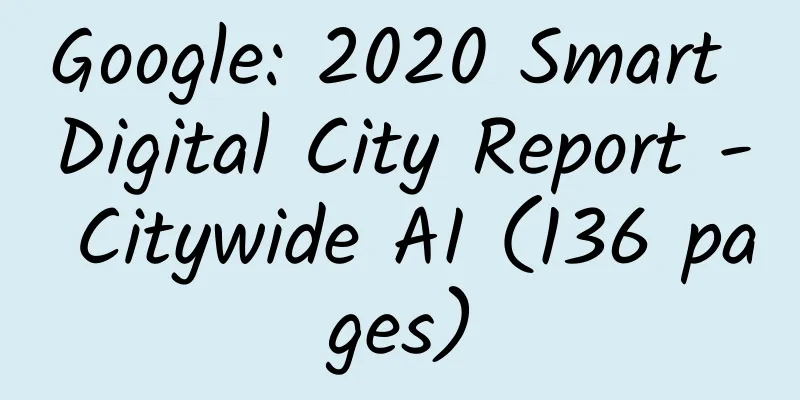Google: 2020 Smart Digital City Report - Citywide AI (136 pages)

|
Google Hong Kong today released the first edition of the white paper "Smart Digital City - Citywide AI" and announced the "AI Readiness Index". Google Hong Kong commissioned KPMG to conduct this three-year study to reveal Hong Kong's readiness for the cognition and application of artificial intelligence (AI). With 100 as the full score, the AI readiness index of Hong Kong citizens is 50, and the AI readiness index of enterprises is 56, reflecting that Hong Kong has a solid foundation and ideal development prospects in the application of artificial intelligence and innovative technologies. Linda Yu, Managing Director of Sales and Operations at Google Hong Kong, said: “The pandemic this year has had a wide-ranging impact on individuals, society and all walks of life. This new research project explores how Hong Kong can seize new opportunities and help the economy recover through the application of technology and artificial intelligence. In fact, artificial intelligence has been applied to products and services commonly used by Hong Kong people, and Hong Kong companies are also using AI-based productivity tools, cloud solutions and digital marketing platforms. The results of this research are encouraging, reflecting that Hong Kong citizens and companies are optimistic and open to artificial intelligence, and hope to master relevant knowledge to stay competitive, which is laying a good foundation for the development of a smart digital city.” Ms Yu added: “In the post-pandemic era, sustainable teamwork and closer cooperation and communication are of utmost importance. To help everyone better understand AI, we have launched the Traditional Chinese version of the ‘A to Z Guide to Artificial Intelligence’ in Hong Kong, which explains the concepts, technologies and operations of AI in an easy-to-understand way. Local higher education institutions are also interested in adding AI and machine learning basics teaching materials provided by Google, including ‘Explore ML’ and ‘TensorFlow’, to their courses.” Olehane, Partner, Head of Technology Advisory, KPMG China, Hong Kong, said: “Given that the COVID-19 pandemic has significantly accelerated the digital transformation of many industries and changed individual behaviours, we are delighted to conduct this timely study with Google Hong Kong to set a new benchmark for assessing the maturity of AI adoption in the local area. It provides insights into the levels of AI expertise, confidence, setup, usage and spending, helping businesses and decision makers to better formulate strategies to meet the new and evolving needs.” Affirming the positive impact of artificial intelligence, knowledge and talents need to be strengthened Hong Kong citizens and businesses agree that artificial intelligence can bring positive impacts and opportunities. 65% of the citizens surveyed expect artificial intelligence to bring positive effects to society, 63% believe that convenience is the main reason for applying artificial intelligence, and the most commonly used related products and services are intelligent translation (80%) and intelligent route suggestions (79%). However, the survey reflects that citizens are concerned about their data being used without their knowledge or permission (49%), and the cost of using related products and services (40%). The citizens surveyed expect the business community (70%) and public institutions (81%) to help promote artificial intelligence-related education. Many expressed interest in understanding the basics of artificial intelligence and machine learning (44%), the technical applications and cases of artificial intelligence and machine learning (44%), and data science and data analysis (42%). As for enterprises, 78% believe that artificial intelligence will bring more benefits and improve society, especially improving quality and efficiency and promoting economic recovery. However, shortages of funds (56%), knowledge (51%) and talents (50%) are still the main obstacles to the application of artificial intelligence. Among the five indicators of the AI Readiness Index, the "expenditure" indicator of enterprises is higher than other indicators, reflecting that enterprises are actively researching and investing in future investments in artificial intelligence. The lower-scoring "knowledge" indicator reflects that enterprises are lacking relevant expertise and talents. Although 49% of enterprises have formulated big data strategies, currently only 31% of enterprises have their own databases or enrich their databases through third parties. Enterprises must have appropriate settings and adjust their operating models, such as making good use of cloud solutions, formulating data management guidelines, etc., to promote the application of artificial intelligence. Artificial intelligence can also help companies deal with risk management, improve operational efficiency and product and service quality, and cater to rapidly changing consumer needs. In terms of SMEs, SMEs expect to have a clear return on investment. Compared with 21% of large enterprises, 31% of SMEs believe that lack of funds is an obstacle to the application of artificial intelligence. In fact, many solutions using artificial intelligence technology meet the needs of Hong Kong SMEs. SMEs should have a clear understanding of the most urgent business problems that the company needs to solve, and then choose the appropriate technical solutions, such as applying data analysis to improve product and inventory combinations or supply chain management. Promote and popularize AI applications The pandemic has led to a surge in demand for digital solutions, prompting the public and private sectors to rethink and adjust their development strategies. Therefore, it is important to build public trust in artificial intelligence, so that users can more easily control their personal data and data management, and use products and services supported by artificial intelligence technology with greater confidence. Policy makers and regulators play an important role in promoting the development of artificial intelligence. They need to formulate corresponding regulatory measures to enhance confidence and eliminate the business community's doubts about regulation. At the same time, private enterprises and public institutions should take the lead in strengthening education and on-the-job training. Private enterprises should make full use of data benefits to make more informed decisions. Improving industry knowledge and cultivating innovative talents are the way to long-term success. The PDF version will be shared on 199IT Knowledge Planet, just scan the QR code below! |
<<: Intel thinks the 'Jellyfish' graphics card virus isn't that scary
>>: 360: 2019 Intelligent Connected Vehicle Information Security Annual Report
Recommend
Please don't let programmers grope in the dark
I don’t know if you have ever played strategy gam...
The pain points of user growth and 4 strategies!
This article mainly wants to talk about user grow...
Operational Tips: A Checklist for Operational Review
I have previously posted a tweet about the review...
From 10,000+ global user reviews, I found these 6 points
Do you think that user reviews of apps are valuab...
Detailed explanation of Xiaomi App Market ASO keyword ranking
Today we are going to talk about the process of X...
Taking Xiaohongshu as an example, let’s talk about data analysis!
Xiaohongshu has become one of the fastest growing...
iOS alternative memory management
[[129290]] OS memory management is a commonplace ...
Xu Yuan's investment course teaches you wealth appreciation, financial management knowledge, fund and stock course tutorial
Xu Yuan's investment course teaches you how t...
Foxconn begins to come to the fore. What kind of game is Terry Gou playing?
Since Foxconn acquired Sharp, every decision made...
Aerobics first or resistance first? You may have made a mistake when you love to hang out at the gym...
Compiled by: Gong Zixin Go into the gym, Which di...
Who benefits from the double points game?
With the implementation of the "Double Point...
Since hydrogen energy is so good, why are we only using it now?
At the opening ceremony of the Winter Olympics tw...
How much do you know about the information flow advertising routines of highly profitable products?
After reading this article, I hope you can improv...
NetQin wades through "muddy water": all charges are cleared and the stock price surges 34%
In response to the fraud allegations made by shor...
WM Motor brought the world's most powerful 1.8-second "WM Champion" and the new WM W6 520km ACE Extreme Edition equipped with OTA2.0 version to the Chengdu Auto Show!
On August 29, WM Motor, the "number one smar...









